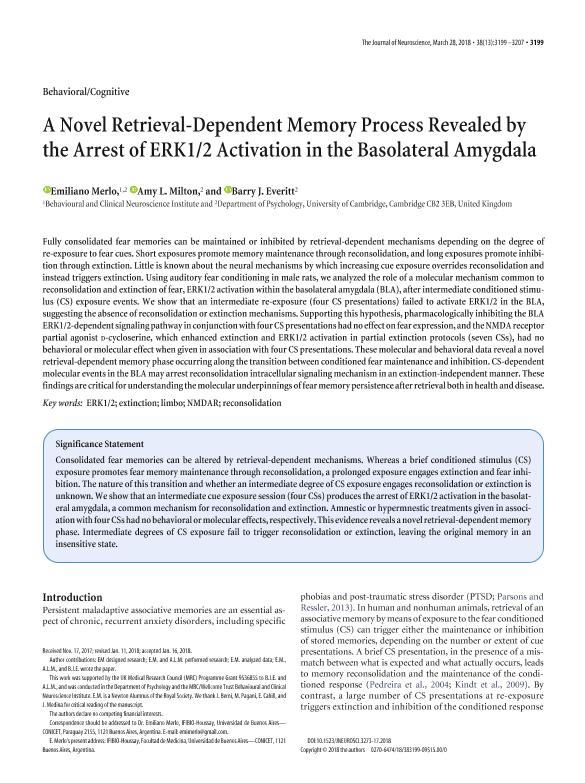Mostrar el registro sencillo del ítem
dc.contributor.author
Merlo, Emiliano

dc.contributor.author
Milton, Amy L.
dc.contributor.author
Everitt, Barry J.
dc.date.available
2019-10-31T19:52:17Z
dc.date.issued
2018-03
dc.identifier.citation
Merlo, Emiliano; Milton, Amy L.; Everitt, Barry J.; A novel retrieval-dependent memory process revealed by the arrest of ERK1/2 activation in the basolateral amygdala; Society for Neuroscience; Journal of Neuroscience; 38; 13; 3-2018; 3199-3207
dc.identifier.issn
0270-6474
dc.identifier.uri
http://hdl.handle.net/11336/87777
dc.description.abstract
Fully consolidated fear memories can be maintained or inhibited by retrieval-dependent mechanisms depending on the degree of re-exposure to fear cues. Short exposures promote memory maintenance through reconsolidation, and long exposures promote inhibition through extinction. Little is known about the neural mechanisms by which increasing cue exposure overrides reconsolidation and instead triggers extinction. Using auditory fear conditioning in male rats, we analyzed the role of a molecular mechanism common to reconsolidation and extinction of fear, ERK1/2 activation within the basolateral amygdala (BLA), after intermediate conditioned stimulus (CS) exposure events. We show that an intermediate re-exposure (four CS presentations) failed to activate ERK1/2 in the BLA, suggesting the absence of reconsolidation or extinction mechanisms. Supporting this hypothesis, pharmacologically inhibiting the BLA ERK1/2-dependent signaling pathway in conjunction with four CS presentations had no effect on fear expression, and the NMDA receptor partial agonist D-cycloserine, which enhanced extinction and ERK1/2 activation in partial extinction protocols (seven CSs), had no behavioral or molecular effect when given in association with four CS presentations. These molecular and behavioral data reveal a novel retrieval-dependent memory phase occurring along the transition between conditioned fear maintenance and inhibition. CS-dependent molecular events in the BLA may arrest reconsolidation intracellular signaling mechanism in an extinction-independent manner. These findings are critical for understanding the molecular underpinnings of fear memory persistence after retrieval both in health and disease.
dc.format
application/pdf
dc.language.iso
eng
dc.publisher
Society for Neuroscience

dc.rights
info:eu-repo/semantics/openAccess
dc.rights.uri
https://creativecommons.org/licenses/by-nc-sa/2.5/ar/
dc.subject
ERK1/2
dc.subject
EXTINCTION
dc.subject
LIMBO
dc.subject
NMDAR
dc.subject
RECONSOLIDATION
dc.subject.classification
Neurociencias

dc.subject.classification
Medicina Básica

dc.subject.classification
CIENCIAS MÉDICAS Y DE LA SALUD

dc.title
A novel retrieval-dependent memory process revealed by the arrest of ERK1/2 activation in the basolateral amygdala
dc.type
info:eu-repo/semantics/article
dc.type
info:ar-repo/semantics/artículo
dc.type
info:eu-repo/semantics/publishedVersion
dc.date.updated
2019-10-16T18:52:11Z
dc.journal.volume
38
dc.journal.number
13
dc.journal.pagination
3199-3207
dc.journal.pais
Estados Unidos

dc.description.fil
Fil: Merlo, Emiliano. University of Cambridge; Reino Unido. Consejo Nacional de Investigaciones Científicas y Técnicas. Oficina de Coordinación Administrativa Houssay. Instituto de Fisiología y Biofísica Bernardo Houssay. Universidad de Buenos Aires. Facultad de Medicina. Instituto de Fisiología y Biofísica Bernardo Houssay; Argentina
dc.description.fil
Fil: Milton, Amy L.. University of Cambridge; Reino Unido
dc.description.fil
Fil: Everitt, Barry J.. University of Cambridge; Reino Unido
dc.journal.title
Journal of Neuroscience

dc.relation.alternativeid
info:eu-repo/semantics/altIdentifier/url/https://www.jneurosci.org/content/38/13/3199
dc.relation.alternativeid
info:eu-repo/semantics/altIdentifier/doi/http://dx.doi.org/10.1523/JNEUROSCI.3273-17.2018
Archivos asociados
